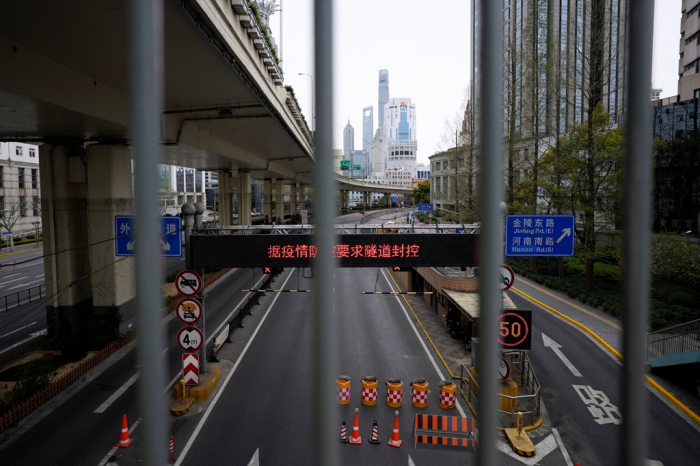COVID-19
Korea firms’ Shanghai plants to remain disrupted long on lockdown
Analysts cut earnings forecasts for Korean consumer goods makers that have production bases in Shanghai
By Apr 15, 2022 (Gmt+09:00)
3
Min read
Most Read
LG Chem to sell water filter business to Glenwood PE for $692 million


Kyobo Life poised to buy Japan’s SBI Group-owned savings bank


KT&G eyes overseas M&A after rejecting activist fund's offer


StockX in merger talks with Naver’s online reseller Kream


Mirae Asset to be named Korea Post’s core real estate fund operator



South Korean companies’ production in Shanghai is expected to remain disrupted long on the lockdown to curb the spread of COVID-19, raising concerns that China’s aggressive policy against the pandemic may hurt their sales in the world’s second-largest economy.
Some of them such as South Korea’s top noodle maker Nongshim Co. resumed production there, but it will take time to normalize factory operations, given restrictions on logistics and transportation, according to industry sources.
About 2,500 South Korean companies currently have businesses in Shanghai, according to Korea Trade-Investment Promotion Agency (KOTRA) on April 14. Among them, major consumer goods makers such as cosmetic giants Amorepacific Corp. and Cosmax Inc., as well as confectionery maker Orion Corp. have major factories there. Most of their production facilities have been disrupted since March 28 when China’s largest city of Shanghai started on lockdown.
Nongshim, the maker of Shin Ramyun, resumed operation of some of the production lines there on April 12 after China eased the lockdown measure on the previous day. Orion, the producer of Choco pie, followed the suit on April 13.
“Some employees living in areas where they can move returned to work,” said a source at Nongshim.
But plants of most other South Korean companies including Amorepacific have been shut.
“The shutdown is longer than expected. We raised output at plants in other regions, but we have no choice but to revise the business plan set up at the beginning of the year,” said an official at a company that has operations in Shanghai.
CUT PROFIT FORECASTS
Analysts cut forecasts for earnings of those consumer goods makers that had been expected to benefit from the global economic reopening.
Cosmax, an original design manufacturer (ODM) and original equipment manufacturer (OEM) of Chinese cosmetic companies, is predicted to see slower growth in its Chinese business due to the shutdown of the Shanghai plant.
Its Shanghai unit, which makes up the largest proportion of sales among the company’s overseas operations, reported a 50% jump in sales to 509.3 billion won ($413.6 million) last year. But Yuanta Securities Korea predicted Cosmax’s first-quarter earnings on a consolidated basis to miss a market forecast due to the production disruption there.
KB Securities Co. and Hyundai Motor Securities lowered Amorepacific’s sales growth and profit forecasts even as the maker of Sulwhasoo lineups said the impact of the factory closure was not significant, given ample stocks.
Nongshim was expected to show a sluggish recovery after its Shanghai unit suffered a 95.8% drop in operating profit last year on surging raw material prices, analysts said.
“The slow consumption (in China) is likely to limit growth in Nongshim’s Chinese subsidiaries,” said Cho Mi-jin, an analyst at NH Investment & Securities.
South Korean companies in Shanghai predicted the lockdown’s impact to last for the time being.
“It will take two to three weeks to normalize factories at least, although the Chinese government eased some of the lockdown measures,” said Lee Jun-yong, head of the Korean Chamber of Commerce in Shanghai, who operates a small enterprise there, in a telephone interview with The Korea Economic Daily.
Write to Soo-Jung Ha at agatha77@hankyung.com
Jongwoo Cheon edited this article.
More to Read
-
 Beauty & CosmeticsCosmetics shares rally amid hopes of eased social distancing
Beauty & CosmeticsCosmetics shares rally amid hopes of eased social distancingMar 27, 2022 (Gmt+09:00)
1 Min read
Comment 0
LOG IN


